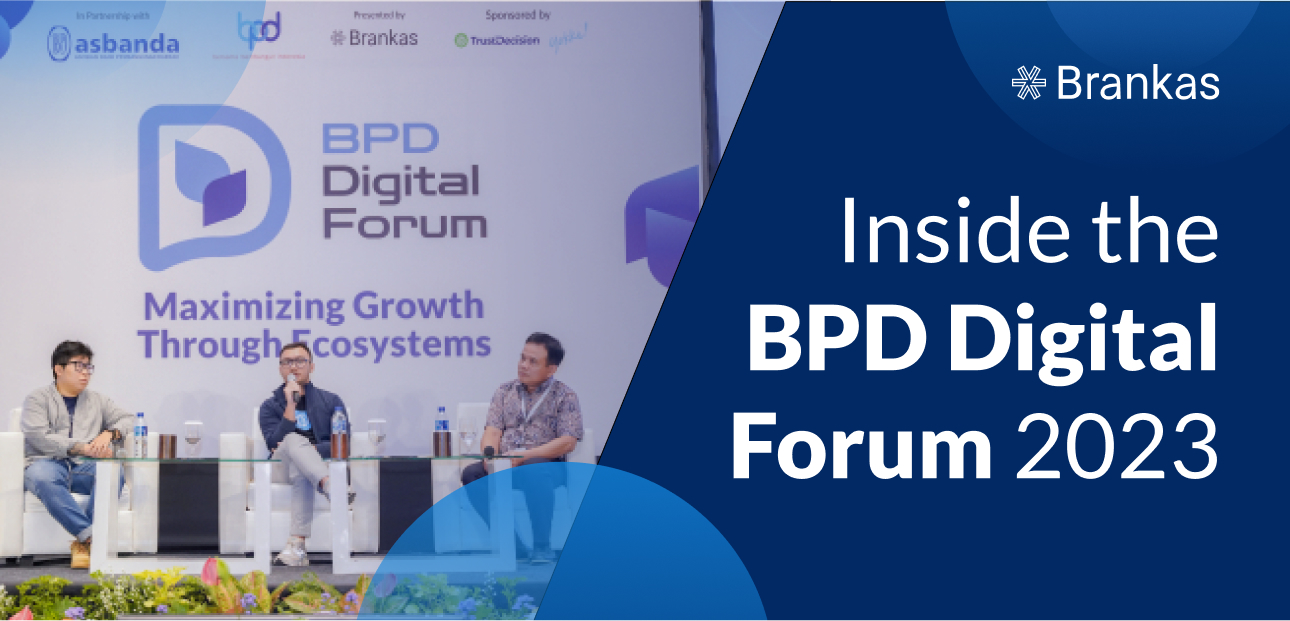
Hosted jointly by Brankas and Asbanda, this event brought together regional development banks from across Indonesia to explore the theme of “Maximizing Growth Through Ecosystems.”

Online loan applications made through digital channels, or digital lending, are expanding quickly. It is easy to use, quick, and available to anyone. The global market value exceeded $12 million in 2022. It is forecasted to hit $71 million by 2032 (Allied Market Research). Technology breakthroughs and consumer need for convenience have substantially increased its appeal.
Data privacy is becoming a bigger worry with the rise of digital lending. Borrowers trust their personal information to online lenders, and data protection is a crucial step in the loan process.
Data is necessary for controlling risks, evaluating borrowers' creditworthiness, and making sure regulations are followed.
Personal data- assists lenders in making sure that only legitimate applicants receive loans and to mitigate the risks of fraud and identity theft. It might consist of full name, address, date of birth, contact information, and employment details.
Financial information- lenders can evaluate the risk of lending to a certain borrower and choose the best conditions and interest rates for their loans. It may include income information, credit score, existing debts, bank statements, and tax returns.
Transactional data- helps lenders build a comprehensive borrower profile, enabling more accurate risk assessments and personalized loan offerings. Typical categories gathered are bank account activity, payment history, purchase patterns, and loan application history.
Data protection is the foundation for safeguarding sensitive information and maintaining the trust and confidence of borrowers. It is impossible to exaggerate the need for robust data protection protocols in the quickly growing digital lending sector. Factors that highlight how important data protection is:
1. Protection against identity theft and fraud
Digital lending platforms handle vast amounts of personal and financial data, making them attractive targets for cybercriminals. Sensitive information such as social security numbers, bank account details, and credit histories can be exposed and lead to identity theft and fraudulent activities.
2. Maintains consumer trust and confidence
Trust is the cornerstone of any financial relationship, especially in the digital space where face-to-face interactions are minimal. Consumers need to feel confident their personal and financial information is secure when they engage with digital lending platforms. Data breaches or lapses in data protection can severely damage a lender’s reputation, leading to a loss of trust and customer attrition.
3. Regulatory compliance
Regulations such as the General Data Protection Regulation (GDPR) in Europe, the California Consumer Privacy Act (CCPA) in the United States, and other regional data protection laws impose strict guidelines on how personal data is collected, processed, and stored. Non-compliance with these regulations can result in severe penalties, legal consequences, and reputational damage.
4. Mitigates financial risks
Data breaches can lead to significant financial losses for digital lending platforms, including costs associated with legal fees, regulatory fines, compensation to affected customers, and investments in remedial security measures. Breaches can result in operational disruptions and loss of business opportunities.
5. Enhances operational efficiency
Secure data handling practices streamline the loan application and approval processes, reduce the risk of errors and fraud, and enhance the accuracy of credit assessments. This leads to faster processing times, better customer service, and a more seamless user experience.
6. Ensures ethical data usage
Borrowers entrust digital lenders with their personal and financial information and expect it to be handled responsibly and used solely for legitimate purposes. Upholding high ethical standards in data protection fosters a culture of transparency and respect for borrower privacy.
One of the primary privacy concerns in digital lending is the extent and manner in which data is collected and shared. Digital lending platforms typically require access to detailed personal and financial information. The collection of such extensive data raises concerns about how securely this information is stored, who has access to it, and how it is used.
The sharing of data with third parties is a significant privacy issue. Digital lenders often collaborate with various service providers for credit assessments, identity verification, and other operational needs. Each time data is shared with a third party, the risk of privacy breaches increases. Borrowers may be unaware of how their data is being used and who has access to it, leading to potential misuse or unauthorized access.
Privacy concerns also extend to the potential misuse of personal information by digital lending platforms or their partners. There is a risk that borrowers' data could be used for purposes beyond the original intent of the loan application. Inadequate data protection measures can result in unauthorized access or cyberattacks, where malicious actors can exploit sensitive information for fraudulent activities.
Another significant concern in digital lending is the level of transparency and control consumers have over their personal data. Many borrowers are not fully aware of what data is being collected, how it is being used, or with whom it is being shared. This lack of transparency can lead to mistrust and reluctance to engage with digital lending platforms.
Ensuring data protection and privacy in digital lending is critical to maintaining consumer trust, complying with regulations, and safeguarding sensitive information from cyber threats. Key tactics to accomplish these objectives are as follows:
Implement robust encryption and security measures, such as TLS (Transport Layer Security), AES (Advanced Encryption Standard), and E2EE (End-to-End Encryption).
Practice secure data storage and transmission.
Adopt these privacy-by-design principles: data minimization, purpose limitation, user consent, and access controls.
Conduct regular audits and compliance checks.
Educate and empower consumers.
Protecting personal and financial data is fundamental to maintaining consumer confidence, compliance with regulatory requirements, and preventing cyberattacks. Prioritizing data privacy helps lenders retain a good reputation in the industry and establish enduring bonds with their clients.
Digital lending platforms MUST prioritize data protection as a core component of your business strategy. Make investments in state-of-the-art security systems, follow strict regulatory guidelines, and cultivate an environment of openness and confidence. The future of digital lending depends on your commitment to data protection and privacy.
Eliminate hassles and guarantee client privacy and data security with Brankas APIs.

Hosted jointly by Brankas and Asbanda, this event brought together regional development banks from across Indonesia to explore the theme of “Maximizing Growth Through Ecosystems.”

Ngân hàng Nhà nước Việt Nam đã ban hành Thông tư số 64/2024/TT-NHNN, một khung pháp lý yêu cầu các ngân hàng phải triển khai các Open API chuẩn hóa. Mặc dù sự thay đổi này đòi hỏi các tổ chức tài chính phải thích ứng, Thông tư 64 cũng mang đến cơ hội chiến lược cho các công ty fintech đổi mới sáng tạo.